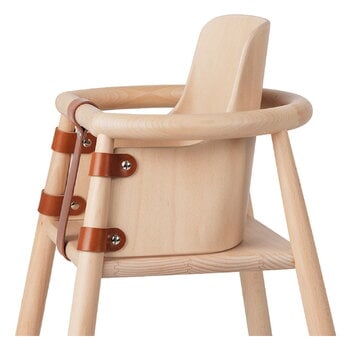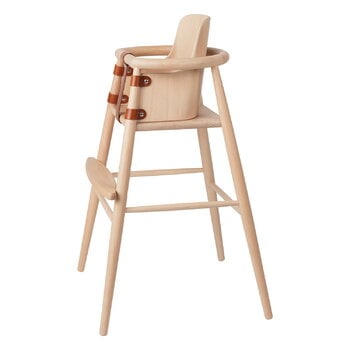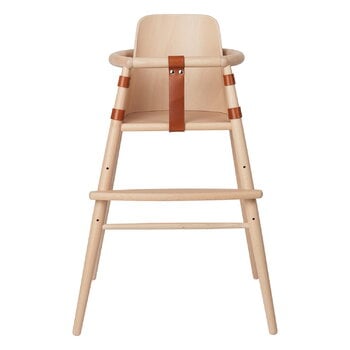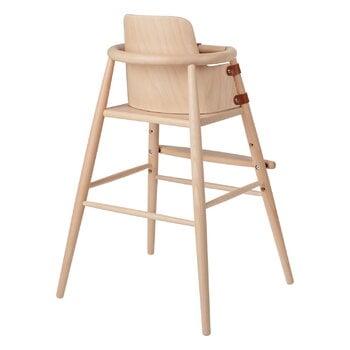This baby backrest is designed for Carl Hansen & Søn’s ND54 high chair, designed by Nanna Ditzel. The backrest helps babies and toddlers to sit firmly and safely in the high chair. The solid beech backrest is treated with a non-toxic and easy-clean matte lacquer and perfected with leather straps. Please note that the ND54 high chair is sold separately.
Baby backrest for ND54 high chair, lacquered beech
Carl Hansen & Søn
Description
This baby backrest is designed for Carl Hansen & Søn’s ND54 high chair, designed by Nanna Ditzel. The backrest helps babies and toddlers to sit firmly and safely in the high chair. The solid beech backrest is treated with a non-toxic and easy-clean matte lacquer and perfected with leather straps. Please note that the ND54 high chair is sold separately.
Product details (6)
- Colour
- Lacquered beech, cognac
- Width
- 31.5 cm
- Depth
- 35.5 cm
- Height
- 29 cm
- Material
- Lacquered beech, leather
- Notes
- Fits together with ND54 high chair.
- Product ID
Designer
Nanna Ditzel (1923–2005) was a Danish designer who studied furniture design in the Royal Danish Academy of Fine Arts and started her career together with her partner Jørgen Ditzel, with whom she designed the famous Hanging Egg chair. After Jørgen’s death in 1961, Nanna Ditzel continued her career in London until returning to Copenhagen in 1986, where she opened her own design studio and furniture workshop.
View all productsReviews (0)
Sustainability
The Product Sustainability Framework, our criteria of sustainable design, helps you find the most sustainable products in our selection. Read below which sustainability criteria this product has met.
Working conditions & labour 8/9
-
Equal opportunities for all employees
-
Commitment to UN Global Compact, fair compensation for all employees
-
Corporate responsibility requirements defined and communicated for suppliers
-
Systematic work for improved inclusion and well-being in the workplace
-
Transparent supply chain
-
Suppliers' compliance to a code of conduct ensured
-
Compliance to the UN Guiding Principles on Business and Human Rights ensured in the supply chain
-
Support for community involvement in the supply chain
-
Direct suppliers audited and certified
Eco-friendly production 7/9
-
Fair and resource-wise water-use in production
-
No incineration or landfilling of returned items
-
No use of endangered species as materials
-
No direct environmental emissions or waste (excl. GHGs) from production
-
The sustainability of direct suppliers' production is addressed and monitored
-
Material-efficient and ecological packaging
-
No potentially harmful chemicals used in own production
-
Production and material sourcing that respect biodiversity, animal rights, and natural ecosystems
-
Positive impact on nature’s well-being through operations that regenerate natural ecosystems
Climate impact 6/8
-
Company's direct greenhouse gas emissions identified and commitment to reduction
-
Product's carbon impact identified and commitment to reduction
-
Guidance on energy- and eco-efficient use of the product
-
Contribution to climate initiatives beyond the brand’s direct operations
-
Low-carbon or compensated transportation
-
100 % renewable energy in own production and operations
-
Carbon footprint of the product calculated and goals set to reduce it
-
Carbon neutral or carbon negative product
Sustainable materials 6/6
-
Sustainable and long-lasting material choices
-
No harmful or hazardous substances
-
Responsible raw material sourcing and production
-
Materials suited for circularity: monomaterials, recyclable finishings, renewable or recycled contents etc.
-
Ecological materials: natural, biodegradable, recyclable or recycled contents
-
Outstanding materials in terms of innovativeness, responsibility, sustainability and circularity: local production or sourcing, 100 % recycled content, C2C-certification etc.
Circular design 5/5
-
High aesthetic quality promoting long-term use of the product
-
Technically durable product design and material choices
-
Design for enduring life-long quality
-
Design and support for product maintenance, repair and upgradability
-
Innovative circular design solutions: circular service system, resale platform, remanufacturing, collection of used products, etc.












